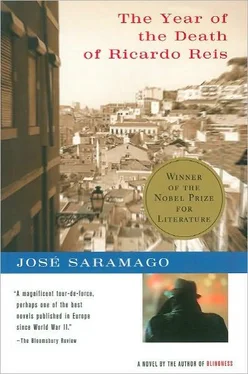José Saramago - Year of the Death of Ricardo Reis
Здесь есть возможность читать онлайн «José Saramago - Year of the Death of Ricardo Reis» весь текст электронной книги совершенно бесплатно (целиком полную версию без сокращений). В некоторых случаях можно слушать аудио, скачать через торрент в формате fb2 и присутствует краткое содержание. Год выпуска: 1992, ISBN: 1992, Издательство: Houghton Mifflin Harcourt, Жанр: Современная проза, на английском языке. Описание произведения, (предисловие) а так же отзывы посетителей доступны на портале библиотеки ЛибКат.
- Название:Year of the Death of Ricardo Reis
- Автор:
- Издательство:Houghton Mifflin Harcourt
- Жанр:
- Год:1992
- ISBN:9780547546926
- Рейтинг книги:4 / 5. Голосов: 1
-
Избранное:Добавить в избранное
- Отзывы:
-
Ваша оценка:
- 80
- 1
- 2
- 3
- 4
- 5
Year of the Death of Ricardo Reis: краткое содержание, описание и аннотация
Предлагаем к чтению аннотацию, описание, краткое содержание или предисловие (зависит от того, что написал сам автор книги «Year of the Death of Ricardo Reis»). Если вы не нашли необходимую информацию о книге — напишите в комментариях, мы постараемся отыскать её.
Year of the Death of Ricardo Reis — читать онлайн бесплатно полную книгу (весь текст) целиком
Ниже представлен текст книги, разбитый по страницам. Система сохранения места последней прочитанной страницы, позволяет с удобством читать онлайн бесплатно книгу «Year of the Death of Ricardo Reis», без необходимости каждый раз заново искать на чём Вы остановились. Поставьте закладку, и сможете в любой момент перейти на страницу, на которой закончили чтение.
Интервал:
Закладка:
THE YEAR OF THE DEATH OF RICARDO REIS
Wise is the man who contents himself with the spectacle of the world.
—RICARDO REISTo choose ways of not acting was ever the concern and scruple of my life.
—BERNARDO SOARESIf they were to tell me that it is absurd to speak
thus of someone who never existed, I should reply
that I have no proof that Lisbon ever existed, or I
who am writing, or any other thing wherever it might be.
—FERNANDO PESSOA...
Here the sea ends and the earth begins. It is raining over the colorless city. The waters of the river are polluted with mud, the riverbanks flooded. A dark vessel, the Highland Brigade , ascends the somber river and is about to anchor at the quay of Alcântara. The steamer is English and belongs to the Royal Mail Line. She crosses the Atlantic between London and Buenos Aires like a weaving shuttle on the highways of the sea, backward and forward, always calling at the same ports, La Plata, Montevideo, Santos, Rio de Janeiro, Pernambuco, Las Palmas, in this order or vice versa, and unless she is shipwrecked, the steamer will also call at Vigo and Boulogne-sur-Mer before finally entering the Thames just as she is now entering the Tagus, and one does not ask which is the greater river, which the greater town. She is not a large vessel, fourteen thousand tons, but quite seaworthy, as was demonstrated during this crossing when, despite constant rough weather, only those unaccustomed to ocean voyages were seasick, or those accustomed but who suffer from an incurably delicate stomach. On account of the homey atmosphere and comforts on board, the ship has come to be affectionately known, like her twin the Highland Monarch , as the family steamer. Both vessels are equipped with spacious decks for games and sunbathing, even cricket, a field sport, can be played on deck, which shows that for the British Empire nothing is impossible. When the weather is fine, the Highland Brigade becomes a garden for children and a paradise for the elderly, but not today, because it is raining and this is our last afternoon on board. Behind windowpanes ingrained with salt the children peer out at the gray city, which lies flat above the hills as if built entirely of one-story houses. Yonder, perhaps, you catch a glimpse of a high dome, some thrusting gable, an outline suggesting a castle ruin, unless this is simply an illusion, a chimera, a mirage created by the shifting curtain of the waters that descend from the leaden sky. The foreign children, whom nature has endowed more generously with the virtue of inquisitiveness, are curious to know the name of the port. Their parents tell them or it is spelled out by their nurses, amas, bonnes, Fräuleins , or perhaps by a passing sailor on his way to some maneuver. Lisboa, Lisbon, Lisbonne, Lissabon, there are four different ways of saying it, leaving aside the variants and mistaken forms. And so the children come to know what they did not know before, and that is what they knew already, nothing, merely a name, causing even greater confusion in their childish minds, a name pronounced with the accent peculiar to the Argentinians, if that is what they happen to be, or to the Uruguayans, the Brazilians, the Spaniards. The latter, writing Lisbon correctly in their respective versions of Castilian or Portuguese, then pronounce it in their own way, a way beyond the reach of ordinary hearing or any representation in writing. When the Highland Brigade sails up the straits early tomorrow morning, let us hope there will be a little sunshine and a clear sky, so that the gray mist does not completely obscure, even within sight of land, the already fading memory of those voyagers who passed here for the first time, those children who repeated the word Lisbon, transforming it into some other name, those adults who knitted their eyebrows and shivered with the general dampness which penetrates the wood and metal, as if the Highland Brigade had emerged dripping from the bottom of the sea, a ship twice transformed into a phantom. No one by choice or inclination would remain in this port.
A few passengers are about to disembark. The steamer has docked, the gangplank has been lowered and secured, unhurried baggage handlers and stevedores appear below, guards emerge from the shelter of their huts and sheds, and the customs officers begin to arrive. The rain has eased off and almost stopped. The passengers gather at the top of the gangplank, hesitant, as if in some doubt as to whether permission has been granted to disembark, or whether there could be a quarantine, or perhaps they are apprehensive about those slippery steps. But it is the silent city that frightens them, perhaps all its inhabitants have perished and the rain is only falling to dissolve into mud what has remained standing. Along the quayside grimy portholes glow dimly, the spars are branches lopped from trees, the hoists are still. It is Sunday. Beyond the docksheds lies the somber city, enclosed by façades and walls, as yet protected from the rain, perhaps drawing back a heavy, embroidered curtain, looking out with vacant eyes, listening to the water gurgling on the rooftops, down the drainpipes to the gutters below, and onto the gleaming limestone of the pavement to the brimming drains, some of their covers raised where they have flooded.
The first passengers disembark. Their shoulders bent under the monotonous rain, they carry sacks and suitcases and have the lost expression of those who have endured the voyage as if in a dream of flowing images, between sea and sky, the prow going up and down like a metronome, the waves rising and falling, the hypnotic horizon. Someone is carrying a child in his arms, a child so silent it must be Portuguese. It does not ask where they are, or else it was promised that if it went to sleep at once in that stuffy berth, it would wake up in a beautiful city where it would live happily ever after. Another fairy tale, for these people have been unable to endure the hardships of emigration. An elderly woman who insists on opening her umbrella has dropped the green tin box shaped like a little trunk that she was carrying under her arm. The box has crashed onto the pebbles on the quayside, breaking open, its bottom falling out. It contained nothing of value, a few souvenirs, some bits of colored cloth, letters and photographs scattered by the wind, some glass beads shattered into smithereens, balls of white yarn now badly stained, one of them disappearing between the quayside and the side of the ship. The woman is a third-class passenger.
As they set foot on land, the passengers run to take shelter. The foreigners mutter about the storm as if we were responsible for the bad weather, they appear to forget that in their beloved France or England the weather is usually a great deal worse. In short, they use the slightest pretext, even nature's rain, to express their contempt for poorer nations. We have more serious reasons for complaint, but we remain silent. This is a foul winter, with whatever crops there were uprooted from the fertile soil, and how we miss them, being such a small country. The baggage is already being unloaded. Under their glossy capes the sailors resemble hooded wizards, while, down below, the Portuguese porters move swiftly in their peaked caps and short jackets weatherproofed and lined, so indifferent to the deluge that they astonish all who watch. Perhaps this disdain for personal comfort will move the purses of the passengers, or wallets as one says nowadays, to take pity on them, and that pity will be converted into tips. A backward clan, with outstretched hand, each man sells what he possesses in good measure, resignation, humility, patience, may we continue to find people who trade in this world with such wares. The passengers go through customs, few in number, but it will take them some time to get out, for there are many forms to be filled in and the handwriting of the customs officers on duty is painstaking. It is just possible that the quickest of them will get some rest this Sunday. It is growing dark although it is only four o'clock, a few more shadows and it will be night, but in here it is always night, the dim lamps lit all day long and some burned out. That lamp there has been out for a week and still hasn't been replaced. The windows, covered with grime, allow a watery light to penetrate. The heavy air smells of damp clothing, rancid baggage, the cheap material of uniforms, and there is not a trace of happiness in this homecoming. The customs shed is an antechamber, a limbo, before one passes on to what awaits outside.
Читать дальшеИнтервал:
Закладка:
Похожие книги на «Year of the Death of Ricardo Reis»
Представляем Вашему вниманию похожие книги на «Year of the Death of Ricardo Reis» списком для выбора. Мы отобрали схожую по названию и смыслу литературу в надежде предоставить читателям больше вариантов отыскать новые, интересные, ещё непрочитанные произведения.
Обсуждение, отзывы о книге «Year of the Death of Ricardo Reis» и просто собственные мнения читателей. Оставьте ваши комментарии, напишите, что Вы думаете о произведении, его смысле или главных героях. Укажите что конкретно понравилось, а что нет, и почему Вы так считаете.












